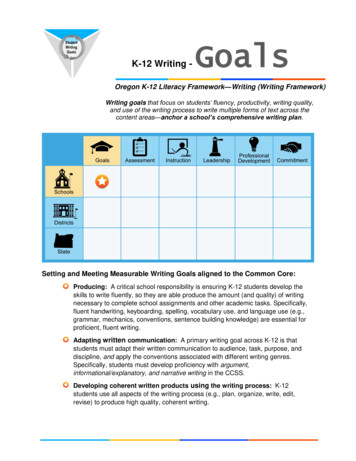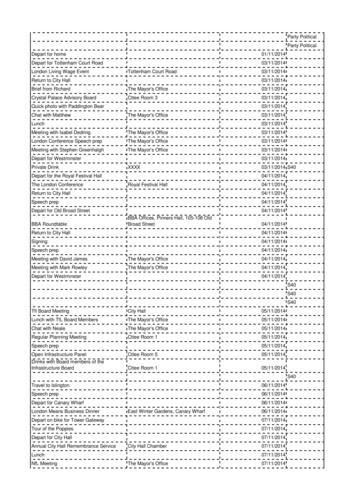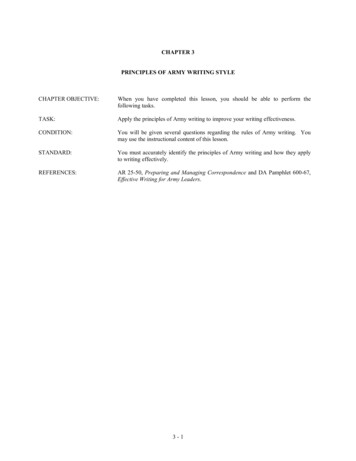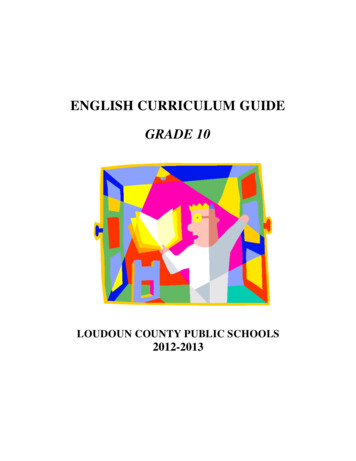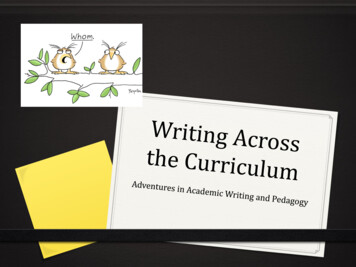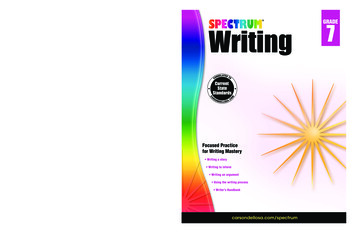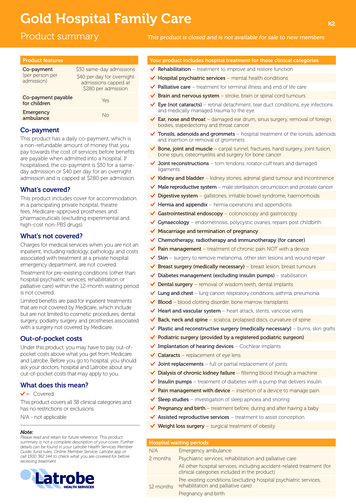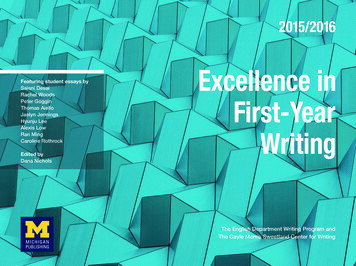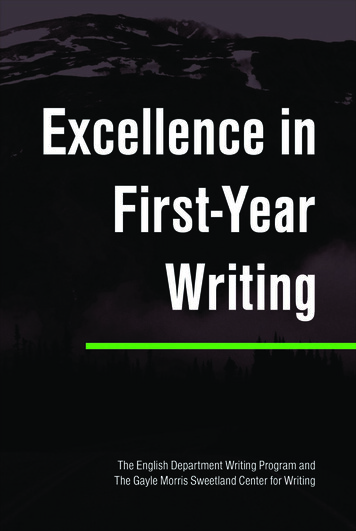
Transcription
ExcellenceinFirst-Year Writing2013/2014The English Department Writing ProgramandThe Gayle Morris Sweetland Center for WritingEdited byShelley Manis and Dana Nichols
Published in 2014 by MPublishingUniversity of Michigan Library 2014 Gayle Morris Sweetland Center for WritingPermission is required to reproduce material from this title in otherpublications, coursepacks, electronic products, and other media.Please send permission requests to:MPublishing4186 Shapiro919 South UniversityAnn Arbor, MI 48109lib.pod@umich.eduISBN 978-1-60785-326-8
Table of ContentsExcellence in First-Year WritingWinners list5Nominees list6Introduction11Feinberg Family Prize for Excellence in First-Year Writing13Five Minutes15Mao23Matt Kelley/Granader Family Award for Excellence in First-Year Writing31Oedipus Tyrannus on Causality, Determinism, and Identity33The Struggle of a Lonely Banana39Granader Family Prize for Outstanding Writing Portfolioneila10047Writer’s Home59Excellence in First-Year Writing 2014 3
Excellence in First-Year Writing 2013/2014EDWP Writing Prize CommitteeChristie Allen, co-chairAlexandra KruseJulia Hansen, co-chairSarah LinwickCassius AdairEliza MathieBonnie ApplebeetMelinda MisenerBrittany BennettAran RuthAngela BerkleyLogan SchererKathryne BevilacquaAubrey SchiavoneRussell BrakefieldJoshua ShipperAbigail CelisMeg SweeneyRachel GreeneAlice TsayNick HarpBonnie TuckerMarcelo HernandezPam WolpertSweetland Writing Prize CommitteeShelley Manis, co-chairRaymond McDanielDana Nichols, co-chairChristine ModeyScott BealLiliana NaydanLouis CicciarelliSimone SessoloTim HedgesNaomi SilverJamie JonesAdministrative SupportHanna LinnaLaura SchulyerAaron Valdez4 Excellence in First-Year Writing 2014
Winners ListFeinberg Family Prize for Excellence in First-Year WritingKaren Duan“Five Minutes”nominated by James Pinto, English 125Connie Zuo“Mao”nominated by Jaimien Delp, English 125Matt Kelley/Granader Family Prize for Excellence in First-Year WritingCallie Chappell“Oedipus Tyrannus on Causality, Determinism, and Identity”nominated by Matthew Cohn, Great Books 191Sin Ye Hwang“The Struggle of a Lonely Banana”nominated by Hilary Levinson, Comparative Literature 122Granader Family Prize for Outstanding Writing PortfolioNeila Fraiha“neila100”nominated by Liliana Naydan, Writing 100Christopher J. Zysnarski“Writer’s Home”nominated by Liliana Naydan, Writing 100Excellence in First-Year Writing 2014 5
Nominees ListFeinberg Family Prize nomineesStudent NameInstructor NameEric AchterhofAubrey SchiavoneAyomide AkinokunDavid GoldMallory AndersonBonnie TuckerNicole AntinRachel GreeneBianca ArredondoJames HammondCameron BarnesMatthew BellamyCici BeckerPatricia KhleifPatrick BirdsongChristopher McCormickKatherine BlackMaximillian AlvarezRaymond ChungJessica YoungKatie ColellaJames PintoLauren DodgeRebecca SchermNicholas DolnicekKyle GradyErin DonahueMickenzie FastelandKaren DuanJames PintoErich EberhardD’Anne WitkowskiJoseph EvansChristopher McCormickJacob GaseKaren McConnellCarolyn GearigBonnie TuckerMohamed GhandourJessica YoungHelen GianakopoulosRachel GreeneSophia GinottiBonnie ApplebeetAmalia Gomez-RexrodeEmily WaplesToby HellerSarah LinwickLuke JacksonPatricia Khleif6 Excellence in First-Year Writing 2014
Rachel JohnAnn BurkeKatherine KelleyPatricia KhleifRachel KerrJames PintoJustin KimAnne PorterZachary KirkpatrickMatthew BellamyJulia KnowlesCordelia ZukermanHarry KrinskyJames PintoMary KrukCarolyn DekkerLauren KrzisnikKatherine GoldeyErin LashbrookCarolyn DekkerCrystal LeeKatherine GoldeyJerin LeeAnna KnutsonJoanna LeungJames PintoRachel LiangPatricia KhleifMartha McAlister-RaeburnRebecca SchermMadison McCulloughJonathan YipMeagan ParmenterMaximillian AlvarezAndrea PeschPam WolpertEva PeterKatherine LennardAllison PowellJessica YoungJacob RaineyJessica YoungJennifer RamseyHenry LeungKavita RavalJessica GetmanIlhana RedzovicAnna KnutsonAaron RosenRebecca SchermCollin RushJessica YoungSahal SalehRebecca SchermCourtney SalleyBonnie ApplebeetMeaghan SchifflerRebecca SchermWilliam SextonJessica GetmanExcellence in First-Year Writing 2014 7
Prashant SharmaAnne PorterJacob StanageJessica YoungKierra TarranceRocco SamueleMegan TaylorAli ShapiroSarah WoloszykAubrey SchiavoneWuliang ZhangDavid GoldConnie ZuoJaimien DelpMatt Kelley/Granader Family Prize nomineesStudent NameInstructor NameBrandon AlexanderStephanie BolzRachael AnkleyT HetzelKatherine BlackMaximillian AlvarezFreida BlosteinDavid BurkamKonhee ChangVirginia MurphyCallie ChappellMatthew CohnHaley FoxTim HedgesGabrielle GravesTim HedgesDerek HeitmanMaayan EitanAllison HogikyanMelissa GelinasSin Ye HwangHilary LevinsonSonalee JoshiPaul BarronJustin KimAnne PorterFrank MortonMaximillian AlvarezFrancine PenikisMatthew CohnTimothy PrecordEvelyn AdkinsVictoria RilettEvelyn AdkinsDominic RusselStephanie Bolz8 Excellence in First-Year Writing 2014
Carley SantoriMaayan EitanAlyssa SkeltonJoseph GrovesMaddie ThomasVirginia MurphyJacob TukelKatherine GoldeyGranader Family Portfolio Prize nomineesStudent NameInstructor NameAnnEliza Canning-SkinnerGina BrandolinoNeila FraihaLiliana NaydanMahin MunirGina BrandolinoFrederick NewingPaul BarronEmily RobertsT HetzelAndrea RousseauSimone SessoloJacqueline SiegelScott BealStacey Van BuskirkScott BealAlexandra WerthSimone SessoloChristopher ZysnarskiLiliana NaydanExcellence in First-Year Writing 2014 9
IntroductionEvery day, hundreds of students at the University of Michigan work hardto develop their skills as writers. Every winter, we have a chance to sample thefruits of this labor as we select winners for the first-year writing prize. The EnglishDepartment Writing Program and the Sweetland Center for Writing established afirst-year writing prize in 2010. With generous support from the Sweetland Centerfor Writing and from Andrew Feinberg and Stacia Smith, both of whom earnedEnglish degrees from the University of Michigan, we have developed a traditionof honoring students who have produced writing of exceptional quality. This year,thanks to a generous gift from the Granader Family, the prizes for Sweetland prizeswill be more substantial.We are delighted by this development not just because students will receivea more tangible reward for their work but also because named prizes lend morevisibility to the competition and its winners. Another dimension of that visibilityis this collection. In it we share the writing of prize-winning students so that otherwriters may learn from, and feel inspired by, their examples. Thanks to the carefulediting of Shelley Manis and Dana Nichols as well as Aaron Valdez’s design, theaward-winning essays are shown to best advantage. As a group they illustrate howwriters formulate compelling questions, engage in dialogue with other thinkers,incorporate persuasive and illuminating evidence, express powerful and poeticinsights, and participate in meaningful conversations.Many writers were involved in discussing and selecting these prize-winningessays. The electronic portfolios produced in Sweetland’s Writing 100 were readand discussed by Lila Naydan, Jamie Jones, Naomi Silver, Christine Modey, andExcellence in First-Year Writing 2014 11
Shelley Manis. Entries for the Matt Kelley/Granader Family Prize for Excellencein First-Year Writing were read and discussed by Tim Hedges, Simone Sessolo,Raymond McDaniel, Scott Beal, Louis Cicciarelli, and Dana Nichols. Entries forthe English Department Writing Program’s Feinberg Family Writing Prize wereread and discussed by Christie Allen (co-chair), Julia Hansen (co-chair), Cass Adair,Bonnie Applebeet, Brittany Bennett, Angela Berkley, Kathryne Bevilacqua, RussellBrakefield, Abigail Celis, Rachel Greene, Nick Harp, Marcelo Hernandez, Alexandra Kruse, Sarah Linwick, Eliza Mathie, Melinda Misener, Aran Ruth, LoganScherer, Aubrey Schiavone, Joshua Shipper, Meg Sweeney, Alice Tsay, BonnieTucker, and Pam Wolpert. We are deeply grateful to all of these writers for rollingup their sleeves and participating in the challenging but rewarding work of determining why particular selections merit prizes.We are equally grateful to the many students who submitted essays for thefirst-year writing prize, and the many instructors who encouraged and supportedthem. As writing teachers, we relish the opportunity to learn from the challengingquestions, intellectual energy, creativity, and dedication that our students and theirteachers bring to our classrooms. We hope that you will gain as much pleasure aswe have from reading the writing contained in this volume.Anne Ruggles Gere, Director, Sweetland Center for WritingMeg Sweeney, Director, English Department Writing Program12 Excellence in First-Year Writing 2014
Feinberg Family Prize forExcellence in First-Year WritingWe are delighted to introduce the winning essays from the 2013/2014Feinberg Family Prize in First-Year Writing. This year, we received over sixty strongpieces of student writing, and twenty-four English Department Writing Programinstructors participated in our three rounds of judging. At every stage of the selection process, our judges expressed to us how impressed they were with both thedepth of student writing and the range of writing genres that students are producing in their English 124 and 125 classes here at Michigan. These student essaysmodeled strong research, analysis, narrative, and critical thinking skills, and manyof our judges were inspired as readers, writers, and teachers through the thoughtfulessays and essay prompts they read.The strength of our students’ academic writing across genres is inspiring butnot surprising, as it is one of the goals held in common by all sections of English124/125. Students in first-year writing courses work together and with theirinstructor to produce complex, analytic, well-supported arguments that matter inacademic contexts, and to demonstrate a nuanced understanding of these skills ina variety of kinds of writing and in a variety of rhetorical situations. As the submissions for this year’s Feinberg Family Prize demonstrated, first-year Michiganstudents are learning how to adjust writing for a particular audience, how to acknowledge the limitations of the scope of their own argument, how to analyze andsynthesize different kinds of evidence to develop a central idea, and how to attendto the work of language itself in persuading readers of a point of view. This is just apartial list of the wide range of writing skills students practice and hone with theirpeers and instructor in first-year writing classes.Excellence in First-Year Writing 2014 13
In considering our two winning essays this year, our selection committee wasespecially impressed with how both essays made use of personal experience in orderto discover and articulate meaning that matters beyond one individual. We cameaway from reading these essays feeling that they had really taught us somethingnew in their pursuit of real questions about interpersonal, intergenerational, andintercultural dynamics. And both essays achieved this sense of discovery throughtheir purposeful command of detail and evidence, language, pathos, and narrativestructure. We have been grateful for the opportunity to read the fine work of somany of our first-year writers, including our two winning essays. We are nowpleased to share these excellent pieces with you, and we hope you will find them asinspiring as we have.Christie Allen and Julia HansenCo-Chairs of the Feinberg Family First-Year Writing Prize CommitteeGraduate Student Mentors, English Department Writing Program14 Excellence in First-Year Writing 2014
Five MinutesKaren DuanFrom English 125 (nominated by James Pinto)Karen wrote this wonderful essay for our English 125 class. The prompt called fora personal narrative with a sense of argument, and one of the options was to writeabout a moment of regret.Karen’s essay stands out for many reasons that will be obvious to the reader. One,more hidden reason—a teacherly reason, I suppose—is that this piece offers aremarkable window into the writing process. Karen wrote a first draft that focusedalmost exclusively on the narrative’s moment of transgression. After the fact, shewent back and talked to her mother about their shared memory. That conversationworked its way into subsequent drafts, and in this way, the essay shifted from beingstatic retrospection into something more powerful—a living, evolving text thatbecomes a part of the on-going dialogue between its two central figures.This essay also avoids the great trap that its prompt sets. In searching for meaning,Karen does not attempt to moralize her narrative. Rather, she acknowledges andworks with the messiness of lived experience. So often we try to use our writing asa way to impose order on the complicated realities that surround us. That impulsemakes a good deal of sense—both psychologically and from a writing perspective—and yet it diminishes the truth-telling power of our work. Here Karen describesa tension “that cannot be resolved” and focuses on all the ways that she and hermother are different. Her essay catalogues its author’s failures of empathy, and indoing so—in fact, because it does so—the essay makes a statement that feels bothtrue and achingly empathetic.James PintoExcellence in First-Year Writing 2014 15
Five MinutesEver since I was young, I’ve dreaded trips to the grocery store. Part of thisdread came from the boredom of picking through endless mounds of deterioratingvegetables. Yet, most of it came from a much more gut-wrenching feeling: humiliation. Specifically, the humiliation that surfaced whenever I accompanied mymother to public spaces.I’m the child of two immigrants. My parents left China in 1985 for Japan.They learned Japanese and earned professional degrees there before immigrating toAmerica. They’ve lived in the States for over twenty years now, with English as theirthird language. My father learned it by locking himself in his room and religiouslywatching piles of American movies. He’s currently a college professor. His Englishis almost perfect, practically indiscernible from mine, and he speaks it everyday.My mother’s English, in comparison to my father’s, seems fractured. Afterquitting her job to raise my sister and me, she only speaks English during limitedgrocery store interactions and conversations with friends I invite over. At home,she addresses me almost exclusively in Mandarin, only dropping in an occasionalEnglish word for clarification. Unsurprisingly, her pronunciation carries a sharpAsian accent.On the other hand, my sister and I were born in the States. We speak English with a natural ease my parents have spent decades attempting to acquire, andstill haven’t fully acquired. This linguistic divide between my parents and us oftenfeels like a monumental separation between our two generations. There is a markeddifference between my parents, who still identify with their home country, and mysister and me, who have almost completely assimilated into American culture.Looking back, I’ve always been overly conscious of my mother’s brokenEnglish. It’s always given me a feeling of irrepressible, face-reddening shame. Iguess her poorly articulated speech served as a reminder of my family’s “otherness,”our oriental status, our eternal exclusion from the title of American. At grocerystores, I would rush to translate her jumbled words into “proper” English to the16 Excellence in First-Year Writing 2014
cashiers. At the time, it was probably a self-defense of some sort — an inherentneed to validate myself as a properly assimilated Asian-American, unassociated withmy mother’s choppy speech. I was ashamed of her inability to blend into Americanculture. I was embarrassed of her inauthentic, immigrant past. And in my ownblind pursuit of American authenticity, I often scrapped my mother’s pride in favorof what seemed to be a more valuable reward: acceptance. On further reflection,my embarrassment over my mother’s English was probably the start of my ongoingstruggle to empathize with her immigrant narrative.Perhaps the experience that brought me in closest confrontation with thisstruggle happened the summer after my sophomore year of high school. I had beenpassing time at a friend’s house, four of us drinking juice and mooching around inthe July heat. When it came time to leave, my mother chugged across town in herfaded green station wagon to pick me up. Two of my friends had asked for a ride,and I had cordially agreed. My mother arrived promptly, and I approached herfirst to inform her of our two added stops. She reacted with surprise, but warmlywelcomed my friends.Now that I think about it, my hasty notification of these additionsprobably caught her off-guard. She was obviously flustered when my friendsentered the car. Scrambling to gather herself, she turned around and warbled astrained greeting. My friends smiled, returned the greeting, and piled into the car.As they settled in, my mother further attempted to start a courteous conversation.Yet, the syllables she desired seemed to evade her. It became increasingly clear,in between her stuttered words, that she was struggling to put together a simplequestion. “H-How.” We waited. An awkward atmosphere filled the car as we allsat in tense silence, awaiting the end of her question. Her obvious struggle came atthe great discomfort of everyone in the car, particularly me. With each proceedingword, and no evident progress on the question she intended to form, I began tofeel a familiar resurgence of humiliation. “Today, how.” We waited. From therearview mirror, I watched my friend’s eyes dart in discomfort. The silence betweenher words seemed to magnify ten-fold, as the heavy weight of shame overtook me.Excellence in First-Year Writing 2014 17
I became restless; I could not believe she was having this much difficulty voicinga few basic words. “Um. This.” We waited. I wrung my hands in impudentimpatience, internally willing her to just finish the goddamn sentence. I wanted,more than anything, for her to put an end to the uncomfortable aura that nowengulfed our car. “W-weather.”At last, I snapped, no longer able to stand the sound of her pitiful stammer. In a rush, I hastily turned around to my friends and joked, “Sorry, my momsucks at English.”I cannot write these words without the burdened knowledge that theycame from my own mouth. Although most of the memories from the incidentremain hazy and somewhat forgotten, this sentence stands out like a jagged gashacross my mother’s smooth kitchen floor. To this day, I still wonder — why did Isay that? How could I say that? How could I ever so blatantly disrespect the womanto whom I owe all my accomplishments? The answer eludes me; I tend to burymortifying moments in the back of my mind, never to confront them again. Andyet, I find this particular moment so poignant, so pathetic, and so telling.After I spoke, the car’s religious silence shattered. My friends relaxed theirposture and offered small laughs, before lapsing into casual conversation. I feltrelief. My petty relief came at the sacrifice of my mother’s pride. I remained too immersed in the comfortable atmosphere the car had recovered to notice the way herlaugh cracked. I failed to see her tight-lipped smile. I continued the rest of the carride this way, completely oblivious to the massive amount of betrayal and humiliation I had just given to the woman sitting mere inches from me.In the next few minutes of the car ride, my mother dropped each of myfriends off at their respective homes. She maintained a stoutly pleasant expressionthroughout this process. Yet, immediately after they left the car, her agreeable facade collapsed. She inhaled a ragged breath, and then exploded in rage. The wordsshe shrieked were insignificant compared to the sheer hurt and fury that accompanied them. I stared at her tear-streaked face in awe. I couldn’t comprehend my ownignorance. I couldn’t understand the fact that I had publically insulted her — that I18 Excellence in First-Year Writing 2014
had both ridiculed and trivialized a humble, 20-year long effort to speak a sentenceof unbroken English. It’s only now, looking back almost a full two years later, that Iunderstand the plain cruelty and selfishness of my words.It’s not within my nature to revisit unpleasant memories. Nevertheless, Ican’t stop myself from revisiting this one incident, over and over. I replay my voice,nonchalantly pronouncing the most inconsiderate, impertinent sentence. I replaymy mother’s laugh, so artificial and carefully enunciated. It haunts me. No matterhow hard I try to block the scene out, the guilt endures. Those five minutes in thecar were a razor-thin slice of our lives. Yet I’m sure we’ll remember them, and carrythem with us like a sagging weight on our chests, a load we can never completelyremove. Those minutes were powerful and traumatic. They were a rare instancewhen the underlying tension of our relationship lay completely exposed before us.My mother and I share a relationship marked by the contrasting languageswe speak. At home, I address her in English, while she addresses me in Mandarin.Our conversations move fluidly, the two languages melding together to form a constant stream of sound. It’s a bilingual mode of communication so familiar that I’venever considered its significance in the context of our mother-daughter connection.I never saw its symbolic nature, until the incident in the car.The separate languages my mother and I speak reflect the separate worldswe come from. My mother is an immigrant. She came to America with three yearsof university English and a stomach full of confusion, hope, and fear. She attendedher first job interview while listening to English cassettes, carefully wrapping hermouth around bulging words like “schedule” and “structure.” She tried her firsthamburger reluctantly. The stench disgusted her, so she plugged her nose, slowlymoving the sesame bread and meat down her throat. My mother is full of experiences I will never wholly understand. How does it feel to smile at the store employees who approach you in the sugary, measured voices they reserve for six-year-oldchildren? How does it feel to listen to the laughter of the 17-year-old cashier, loudand booming, as he hears you pronounce “ah-vo-cah-doh”? How does it feel towander through the Detroit Metropolitan Airport, clutching a tiny slip of paperExcellence in First-Year Writing 2014 19
with the words “I don’t speak English,” carefully, painstakingly copied down byyour husband? How does it feel to miss your mother’s funeral because she diedacross the Pacific Ocean?Perhaps the reason I’m so stricken by this incident is because it capturesmy inability to empathize with my mother in its most detrimental light. My mother and I have complicated, individual identities that seldom overlap. We grew upin two different countries under two different cultures. We live largely immersed inour own bubbles of experience, unable to grasp each other’s thoughts and feelingsbecause they are so foreign to our own. It’s a discomforting, often painful experience that breeds practically all the tension in our relationship. And that tensioncannot be resolved. My mother cannot go back in time to grow up in America;I cannot immigrate to my home country. So we’re at a standstill. And yet, I findmyself continuously contemplating this moment, and what it meant for her.Three weeks ago, I broached the incident with my mother for the firsttime since its occurrence. I approached her, riding on a sudden wave of courage.She was drying her hands. As I opened my mouth, my attempt at a sincere tonebecame more of a tentative question. “Remember.that one time I told you yourEnglish sucks.?” I trailed off, unable to continue. Her hands froze mid-motion.She was rigid for a few seconds, perhaps reliving the incident, before she reluctantlyresponded. “Oh. It’s true. My English really is pretty poor.” This acknowledgement shocked me. In a panic, I spluttered a string of garbled reassurances that no,her English does not suck and yes, I can understand her perfectly well. She didn’tseem to hear me. She was ruminating in silence somewhere far beyond my childishconsolation, until she turned around and added, “But it hurts my feelings whenyou tell other people that.” I blushed, feeling a familiar resurgence of humiliation,but for an entirely different reason.My mother and I come from contrasting backdrops. Our differences oftenmake it hard, if not impossible, to empathize with each other, and to understandthe angle we approach our lives from. But when I think about my mother, I thinkof her bending over her glowing iPhone, carefully tapping each square key to text20 Excellence in First-Year Writing 2014
me in English. I think of her sitting at our kitchen table, mumbling “avocado” overand over as she peels a yam. Five minutes is a razor-thin slice of our lives. It’s notenough to induce a revolution, and certainly not enough to resolve our tension.But it’s enough, if even just a little, to help me understand how my mother mightfeel when I openly denounce her English.Excellence in First-Year Writing 2014 21
MaoConnie ZuoFrom English 125: (nominated by Jaimien Delp)Connie’s essay comes from the meditative analysis portion of our class, the final offour essays written over the course of the term. For this essay, writers were asked toconsider a more abstract concept and marry it to a question of significance in theirown lives. Using the skills and rhetorical devices developed over our time togetheras a guide, writers were then encouraged to explore their chosen concepts/questionsusing detailed, concrete language and clearly articulated analysis.I was at once impressed by the unique nature, clarity and emotional complexityof Connie’s essay. Her driving question is born of a genuine curiosity about herspiritual connection to cats, and how this form of worship might connect to – evensave her from – her often tumultuous family dynamics. She executes her mediation thoughtfully, recounting moving scenes with a lovely attention to detail, anintuitive sense of language and an honesty that is at once gripping, haunting andbeautiful. Her analysis is quite brave and sophisticated: the eye through which sheviews herself, her family and her pets works to uncover a complex, fully realizedmeditation on love, family, worship and creatures.Jaimien DelpExcellence in First-Year Writing 2014 23
MaoIf only I could pull off what my cats get away with. When my cat Kelsiesmashed a five-hundred-dollar, collector’s coffee table, all she had to do was whiskher brown-striped tail a few times and turn her fearful, clear blue eyes toward myalready softening mom. Yet, when my older sister Angie and I broke a windowwhile throwing rocks at a hornet (great idea, I know), we were exiled to our sixtyyear-old neighbor’s house to sit indoors and watch Civil War documentaries untilwe were worthy of supervision-less play again. When my other cat, Bib, dislikes theturkey tidbits in her cat food, all she has to do is flick a paw, disgusted, and wait formy dad to hurriedly open a new bag of salmon-flavored snacks for her to sample.And to think of all the times I’ve wished for my plate of limp, mushy eggplant toturn into chocolate cake. It’s not fair, but I can’t complain for too long — I tooadore our family cats.I was seven years old when we adopted Bib, and I dressed for the occasionin a white shirt with a pink, sparkly, cartoon kitten printed on it. It was fromLimited Too, a store that sells little girls’ clothing and the associated “coolness”at prices like thirty-five dollars for a t-shirt. I later learned by eavesdropping onmy parents at night that my dad had been laid off, and we shouldn’t have beenshopping at Limited Too, or shopping much at all. But a little girl’s birthday is alittle girl’s birthday, my mom argued.Anyway, I was waiting at the door with Angie when my mom came homefrom work without her usual briefcase and a maroon, plastic kennel instead.On October 17, 2002, my family of four welcomed a black-and-white tuxedokitten aptly named Bib. My mom fussed over the weeks-old kitten, scolding Bibwhile actually adoring every movement of her sharp, little claws. My dad was thehappiest, even happier than Bib in a box of packing peanuts, as he told us aboutthe kitten he raised as a boy growing up in poor, politically-tumultuous China. Foronce, my mom and dad were in agreement over something, and our family quicklycentered on our newest addition as we became cat obsessed together.24 Excellence in First-Year Writing 2014
A year later, I went to a classmate’s birthday party with a wrapped presentand returned with a calico, blue-eyed cat that the host family no longer wanted.Neither my mom nor Bib was particularly receptive of this new cat at first, but Kelsie grew fat alongside Bib as we pampered them both. My mom’s grumbling aboutfive-dollar organic milk and canned albacore tuna gave way to smiles with everypurr or meow. We were happily powerless against their soft, padded feet, the littlepink dots of toes and noses, the coarse tongues, and best of all, the warm stomachshumming like little lawnmowers. From afar, it must’ve been a funny sight – thisAsian American family coddling two fat cats, cradling them like babies, lettingthem sit at the dinner table, and nestling their faces into thick fur that smelled likehome, comfort, and faintly of Fresh Step cat litter. But our two cats have becomemore than just pets. Whenever the dinner table tension becomes too much, Isimply abandon the cold rice I have been poking at and run to my bedroom wheresomewhere, under the bed or inside the laundry hamper or on top of my justwashed sweater, I find a fuzzy lump of a cat. Scooping up Bib or Kelsie, I marchtriumphantly to the kitchen where pursed lips are replaced by begrudging smiles ofadoration. Sle
nominated by Matthew Cohn, Great Books 191 Sin Ye Hwang " e Struggle of a Lonely Banana" nominated by Hilary Levinson, Comparative Literature 122 Granader Family Prize for Outstanding Writing Portfolio Neila Fraiha "neila100" nominated by Liliana Naydan, Writing 100 Christopher J. Zysnarski "Writer's Home"
